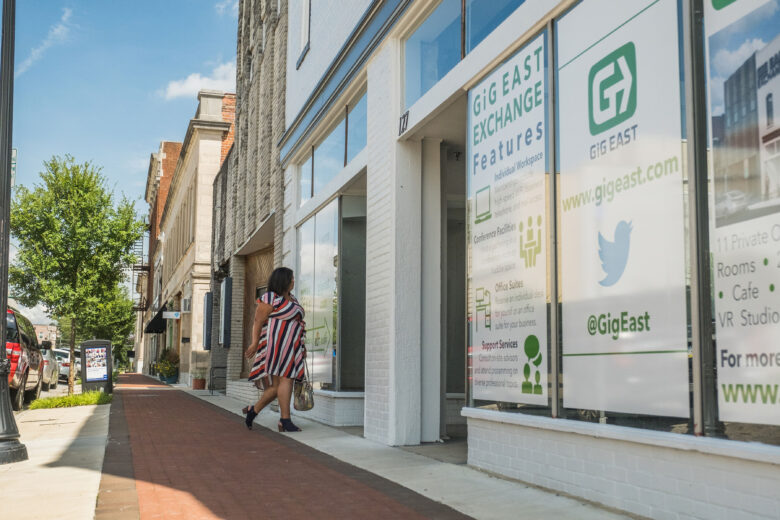
Gig East in Wilson, North Carolina.
Nearly fifty miles to the east of North Carolina’s Research Triangle, a town that has historically lagged the state’s metropolitan centers is working to bring about a brighter economic future. With help from CORI’s Tech Talent Development team, the city of Wilson has brought its key employers and educators together to craft a curriculum geared to the changing needs of an increasingly digital 21st century workforce.
Wilson, a town that had been dependent on the tobacco industry and a major bank, faced a declining agricultural sector and a bank merger that moved the headquarters to Charlotte. The employers that remained in the town, including a Bridgestone plant, were primarily industrial and presented few possibilities for future growth. Especially as tech-based industry surged in nearby cities, the prospect of being left behind – common in rural areas – appeared very real.
“How can we make it better?”
Still, the town had valuable assets. A number of powerful institutions remained active, including Wilson Community College, the town’s chamber of commerce, and the local economic development council. Independently, however, these groups could only do so much – without a workforce with tech skills, local employers were forced to look elsewhere or leave positions unfilled. Conversely, without a clear understanding of employers’ needs, it was difficult for institutions like the community college to skill up the local workforce. The foundations of a tech development program were there – they just hadn’t been put together.
When Wilson joined CORI’s Rural Innovation Network, our Tech Talent Development team conducted a stakeholder evaluation. What we found was a community primed for success: even from the beginning, community members shared a sense of optimism and a willingness to question “here’s the work we’ve been doing: how can we make it better?”
The initial evaluation revealed a desire for greater communication and collaboration across the community, which led our team to gather the town’s major employers together for a series of roundtable discussions focused on employment in Wilson. As with our other Rural Innovation Network communities, CORI planned to host these roundtables every six months to ensure continued contact between the institutions shaping the town’s economic future. Wilson community members thought otherwise.
Taking Initiative – The GIG East Alliance
About a year after the first few meetings, community leaders had found the convenings so helpful that they took the initiative to build on the framework provided during our time in Wilson. From their discussions, they identified a unique opportunity and began a new development association composed of educators and employers: the GIG East Alliance. Once they invited Corley-Moore back to Wilson, she realized the magnitude of the shift that had taken place: the community took the reins of its own development.
The Alliance has worked quickly to solve both sides of the tech talent development equation. With guidance from local employers and support from our team, Wilson Community College has changed its curriculum to better prepare its students for digital employment by local businesses – the college now offers COMPTIA certificates. Wilson’s businesses have tapped into the newfound talent pipeline, providing internships and jobs for the program’s participants. The Chamber of Commerce has even hired an employer concierge to advertise the strength of Wilson’s tech talent pipeline to businesses seeking to locate in the area.
Through implementing the framework for city-wide collaboration, Wilson came together to solve a problem too big for any single institution. Their success modeled that when educators, employers, and employees are aligned, they can take ownership of the development process.
A Community-Owned Future
From our time in Wilson, CORI’s Head of Tech Talent Development Shaniqua Corley-Moore noted: “As we work with rural leaders across the country, our goal is clear: that these communities can take the framework, adapt it to their own needs, and grow self-sufficiently.”
That certainly seems to be the case in Wilson. As the GIG East Alliance keeps working; Wilson Community College graduates find new positions at local employers, and the new base of tech talent attracts large employers like Johnson and Johnson (which recently announced a $2 billion investment in the Wilson area). For Wilson, the future is looking bright.